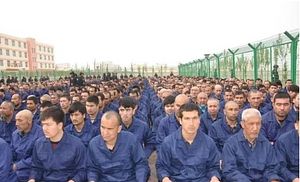As the U.S.-China trade war ramped up this week, Chinese media headlines have been devoted to something else: the Conference on Dialogue of Asian Civilizations, which opened in Beijing on May 15. The event, featuring an opening speech from President Xi Jinping, took top billing on the website of state-run Xinhua New Agency and the official People’s Daily newspaper, relegating bombastic op-eds against new U.S. tariffs to second place.
The week-long event was designed as a celebration of “the diversity of Asian civilizations.” In addition to the conference itself, there were many side events designed to celebrate Asia’s cultural diversity, including a carnival featuring performers from across the continent.
In his opening speech, Xi “called for discarding arrogance and prejudice, deepening the understanding of differences in civilizations, and advancing inter-civilizational exchanges and dialogue,” according to Xinhua.
Coming soon on the heels of a U.S. State Department official’s controversial remarks on China somehow being a threat because it is “not Caucasian,” Chinese media took advantage of the conference to stress a different, more inclusive perspective. Xi called for a four-point approach to building the Asian community: “treating each other with respect and as equals; appreciating the beauty of all civilizations; adhering to openness, inclusiveness, mutual learning; and keeping pace with the times.”
“It is foolish to believe that one’s race and civilization are superior to others,” Xi said. “It is disastrous to willfully reshape or even replace other civilizations.”
The sentiment is a noble one; if only Xi would follow his own advice. It’s difficult to swallow the loud trumpeting of diversity and inclusion for Asian cultures when one of those very cultures – that of the Uyghur ethnic group – is actively being decimated by the Chinese government.
As The Diplomat has reported, Uyghurs and their culture, language, and religious practices are under full-scale attack. A million Uyghurs and other Muslim ethnic minority groups based in the Xinjiang region are believed to have been sent to internment camps – which China bills as “vocational training” centers designed to reduce the threat of terrorism. Even if you take Beijing’s explanation at face-value – and most experts agree you shouldn’t – there’s a distinct whiff of cultural superiority to the very idea, which assumes Uyghurs need help from Han Chinese to adjust to the modern world. “The center is a just a school to make up for lessons the trainees have missed, such as the country’s common language, legal knowledge, and vocational skills so they can catch up with other people and our fast-developing society,” one center’s director told China Daily.
Or as Shohrat Zakir, the head of Xinjiang’s local government, told Xinhua in a 2018 interview, “As a result of the vocational education and training, the social environment of Xinjiang has seen notable changes, with a healthy atmosphere on the rise and improper practices declining.”
Notably, what constitutes a “healthy atmosphere” is decidedly in the eye of the beholder. Many of what China’s government considers “improper practices” are actually cultural markers – attending prayers at mosque, reading the Quran, speaking Uyghur in the workplace or at school, or even growing a beard.
As Xinjiang expert Adrian Zenz, a lecturer in social research methods at the European School of Culture and Theology, Korntal, Germany, told me in an earlier interview, the real goal of the camps is to ensure the Uyghurs and other Muslim minorities “are strongly assimilated, firstly in terms of ethnocultural identity, secondly in terms of ideological convictions.”
“Minorities must be firmly integrated into the Han majority culture and language,” Zenz added, explaining China’s desired outcome. “They can maintain some of their ‘acceptable’ cultural customs and speak their languages as long as they are also fluent in Chinese and culturally close to the mainstream.”
In practice, this means Uyghurs are coerced to betray their cultural and religious beliefs by eating pork, wearing revealing clothing, dancing, and drinking alcohol – all in order to prove their “adaptability to Chinese society.” Even Uyghur language is under siege, as Rustem Shir outlined in a recent op-ed for The Diplomat.
That gives more than a hint of bitter irony to Xi’s proclamation on Wednesday that cultural exchanges “should neither be compulsory or forced, nor one-directional.” The crackdown underway in Xinjiang is all three.
The drive toward cultural assimilation explains why Uyghur intellectuals and artists have been rounded up en masse for detention – even though these highly-educated individuals hardly can be said to need “vocational training.” As the New York Times reported, “[A] list of more than 100 detained Uyghur scholars compiled by exiles includes many prominent poets and writers, university heads and professors of everything from anthropology to Uyghur history… Many of those targeted worked on preserving Uyghur culture.”
Against this backdrop, even the Asian cultural carnival in Beijing this week strikes a sour note. The carnival had invited artists “to perform folk dances, play traditional musical instruments or sing popular songs from their homeland.” Yet one of the Uyghur’s most famous folk singers and poets, Abdurehim Heyit, is in custody for “allegedly violating the national laws.” Many suspect that his actual “crime” was singing songs that promoted Uyghur, rather than Chinese, identity.
“The Chinese… have long come to appreciate the wisdom of ‘harmony without uniformity,’” Xinhua proclaimed, summing up what it saw as the lesson of the Conference on Dialogue of Asian Civilizations. Yet the Chinese government’s actions in Xinjiang belie that anodyne sentiment. The Chinese Communist Party clearly sees harmony only in uniformity. China’s people – of all ethnic groups — have long known this; it’s why the word “harmony” is used as slang to mean “censored” or “erased.”
Now China is actively trying to “harmonize” an entire culture. Don’t forget that while reading about Beijing’s high-profile celebration of cultural diversity this week.

































